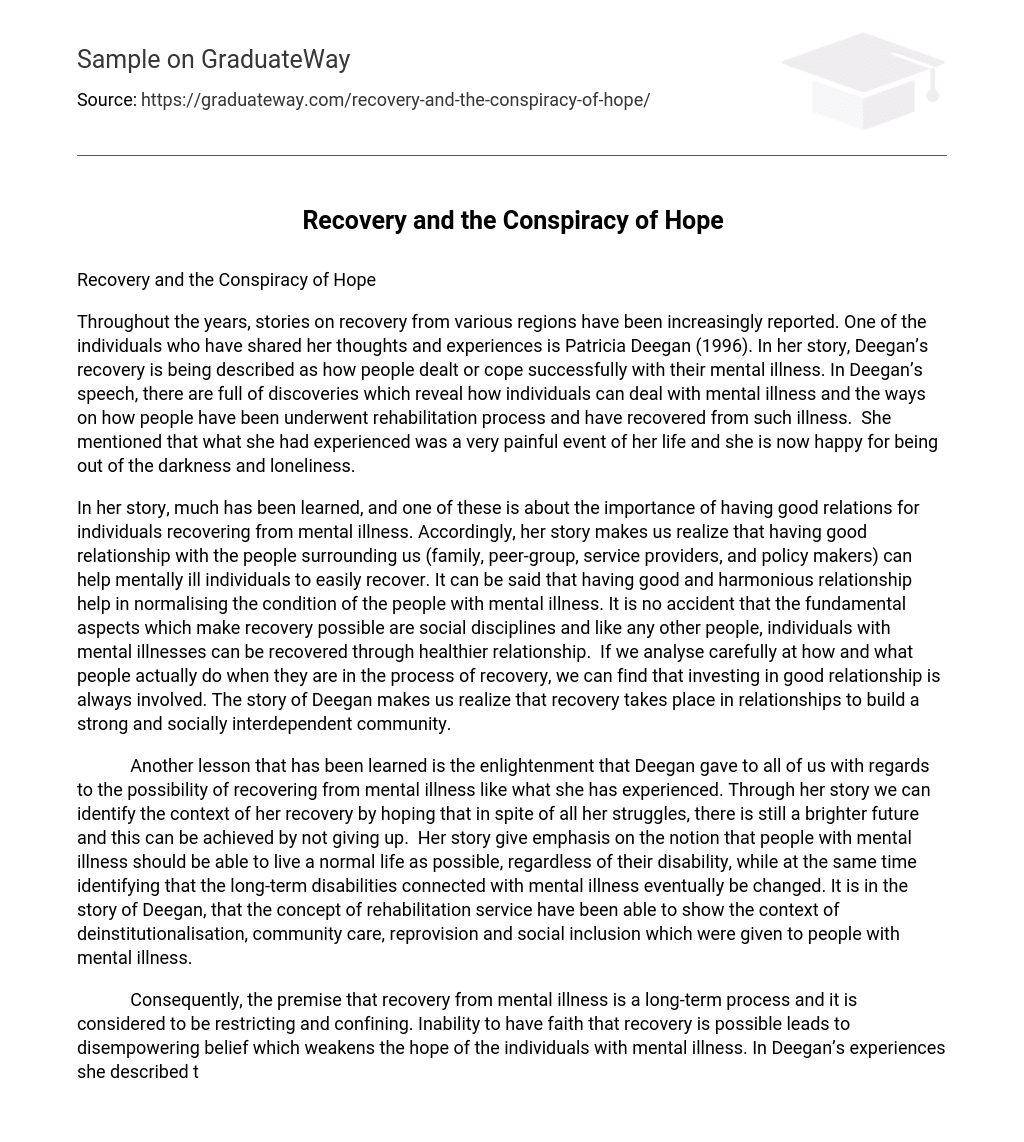Throughout the years, stories on recovery from various regions have been increasingly reported. One of the individuals who have shared her thoughts and experiences is Patricia Deegan (1996). In her story, Deegan’s recovery is being described as how people dealt or cope successfully with their mental illness. In Deegan’s speech, there are full of discoveries which reveal how individuals can deal with mental illness and the ways on how people have been underwent rehabilitation process and have recovered from such illness. She mentioned that what she had experienced was a very painful event of her life and she is now happy for being out of the darkness and loneliness.
In her story, much has been learned, and one of these is about the importance of having good relations for individuals recovering from mental illness. Accordingly, her story makes us realize that having good relationship with the people surrounding us (family, peer-group, service providers, and policy makers) can help mentally ill individuals to easily recover. It can be said that having good and harmonious relationship help in normalising the condition of the people with mental illness. It is no accident that the fundamental aspects which make recovery possible are social disciplines and like any other people, individuals with mental illnesses can be recovered through healthier relationship. If we analyse carefully at how and what people actually do when they are in the process of recovery, we can find that investing in good relationship is always involved. The story of Deegan makes us realize that recovery takes place in relationships to build a strong and socially interdependent community.
Another lesson that has been learned is the enlightenment that Deegan gave to all of us with regards to the possibility of recovering from mental illness like what she has experienced. Through her story we can identify the context of her recovery by hoping that in spite of all her struggles, there is still a brighter future and this can be achieved by not giving up. Her story give emphasis on the notion that people with mental illness should be able to live a normal life as possible, regardless of their disability, while at the same time identifying that the long-term disabilities connected with mental illness eventually be changed. It is in the story of Deegan, that the concept of rehabilitation service have been able to show the context of deinstitutionalisation, community care, reprovision and social inclusion which were given to people with mental illness.
Consequently, the premise that recovery from mental illness is a long-term process and it is considered to be restricting and confining. Inability to have faith that recovery is possible leads to disempowering belief which weakens the hope of the individuals with mental illness. In Deegan’s experiences she described that self-fulfilling characteristics can be a driving force for believing the recovery is possible. As people grow to believe that they have many options and they can use their ability and potentials, they live and behave accordingly. Hence, if a person has a negative vision of themselves, this can keep them trapped in the institutions and their mental illness.
The last lesson learned in Deegan story is the idea of the importance of first person account to enable other individuals with mental illness to be strong and not lose hope for their recovery. Deegan has emphasized that if an individual really want to recover from the illness, they must start within them and they must not stop in believing on what they can do to make themselves better. According to Deegan, people should be committed in removing environmental hindrances that block all efforts towards recovery. For the first person account, the individuals who have mental illness should open themselves to other people for their quick recovery.
In this regard, it can be said that the people such as family and peer-groups and the service institutions that have become a part of the recovery of the Deegan can be considered as efficient and effective to make her recovered immediately. Herein, it can be noted that important linkages between health services and social groups is an important factors for making the recovery of these people possible and successful. With the collaborative efforts of all the people around her, Deegan recovered and now inspiring other people. First person recovery narratives are important source materials which can enable us to refocus our thinking on how it can be used for recovery of others. The story of Deegan served as a strong testament to the reality of recovery and the intrinsic strengths of people who face the challenge of mental illness. Such story of Deegan shows the lived experience of recovery in individuals who were told they should hope for more than a life of long-term illness. Recovery narratives through first person accounts intersect growing interests in narrative in different psychiatric theories and practices.
People can fully recover from mental illness. A strong foundation of healthy relationships, positive attitudes, personal values and beliefs integrated with effective coping skills, supports and resources are important to successful recovery. Full recovery is possible when people have the knowledge, supports, and skills to make changes in their lives.
Reference
Mental Health Commission (2001). Recovery competencies for New Zealand mental health workers. Wellington: Mental Health Commission.
Deegan, P (1996). Recovery and the Conspiracy of Hope. Presented at: “There’s a Person In Here”: The Sixth Annual Mental Health Services Conference of Australia and New Zealand. Brisbane, Australia. Online available at http://www.patdeegan.com/aboutus_paper.html. Retrieve October 7, 2008





